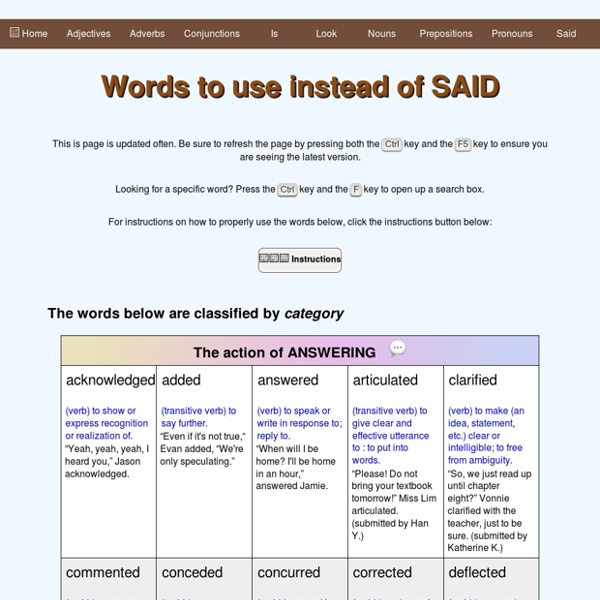219 words to use instead of said from SPWbooks
This is page is updated often. Be sure to refresh the page by pressing both the Ctrl key and the F5 key to ensure you are seeing the latest version. Looking for a specific word? Press the Ctrl key and the F key to open up a search box. For instructions on how to properly use the words below, click the instructions button below: 👨🏼🏫 Instructions The words below are classified by category The words below are classified by emotions Do you have a word that you think should be added to this list, or a comment? 📬 E-mail To those of you who have e-mailed suggestions to me, I would like to say thank you very much. To view the alphebetized list of examples of words to use instead of said, touch the button below to go the examples page. 🦉 Examples To print the list above click the button below to download the PDF file.It takes twenty-three (23) 8.5" x 11" pages to print the list, so you may want to consider double-sided printing. 🖨️ Print 🖨️ Print
Wordiness, Wordiness, Wordiness List
absolutely essential = essential aforementioned = DELETE a bigger/greater/higher/larger degree of = more a considerable amount of = DELETE OR BE SPECIFIC a decreased number of = fewer a distance of 28 kilometers = 28 kilometers a lesser/smaller degree of = less/fewer He noticed a lesser degree of errors = He noticed fewer errors. a lot of = many, much a majority of = most, much of, many a person who is xxx = a xxx person A person who is dedicated will succeed = A dedicated person will succeed. a total of seven xxxs = seven xxxs added bonus = bonus advance notice/reservations = notice/reservations advance warning = warning advance planning = planning after all is/was said and done = DELETE After all was said and done, the trip to the well was a disaster. all across = across all of = all all of a sudden = suddenly all of these = these all-time record = record almost never = seldom along the lines of = like any and all = all are/is such that = DELETE Jack and Jill are such that they are doomed to perish.
CALLIHOO Writing Helps--Feelings Table
Character Feelings You can describe your character's feelings in more exact terms than just "happy" or "sad." Check these lists for the exact nuance to describe your character's intensity of feelings. SF Characters | SF Items | SF Descriptors | SF Places | SF EventsSF Jobs/Occupations | Random Emotions | Emotions List | Intensity of Feelings
Describing a Person or Place
The more I get to know her, the more I realize she has low self-esteem. For one thing, she thinks she is over-weighted, and her troublesome relationship with her boyfriends seemed to confirm that fact for her. At first, I did not know why she never talked much about her family. A month ago, she broken up again with her ninth boy friend, and a stable long-term relationship is not very likely for her. The problems with this piece: The narrator spends too much time telling us what Linda is like, but readers would rather see for themselves. You need to give a vivid portrayal of whatever you are describing. 1. If you are describing a place, tell us how it looks, sounds, feels, and smells, and what it means to you. This is a rewrite of the original. “Look at MY kids! “From the center of downtown the ground slopes gently away to , drops a few feet, and then rolls to the banks of the . And this is a descriptive piece from one of our forum gurus, written from a stationary vantage point.
HT Write Physical Description
Here at Obsidianbookshelf.com, I'm offering the following as my opinion, which is only a tiny representative sample of the writing advice you can find out there on the worldwide web. Remember, you can take or leave anyone's opinion and experiment with writing however you like. You're welcome to print out this how-to for your own use, or your critique group's use, or you can link back to this article from your blog, but please don't copy this content to your blog or website. My Preference. This preference is typical of readers of literary fiction, mainstream fiction, mysteries, and science fiction. If you're writing romance ( m/m, m/f, or f/f), you need to include a lot of physical description of your main characters because the genre centers on love and sexual attraction. That said, I love descriptions of eye color. How descriptive you get depends on your genre, but it can also vary based on what else you're trying to do with the description. A note on the advice to be found here.
Related:
Related:



